Benzene Lawsuit Attorney
Benzene Cancer Lawsuits
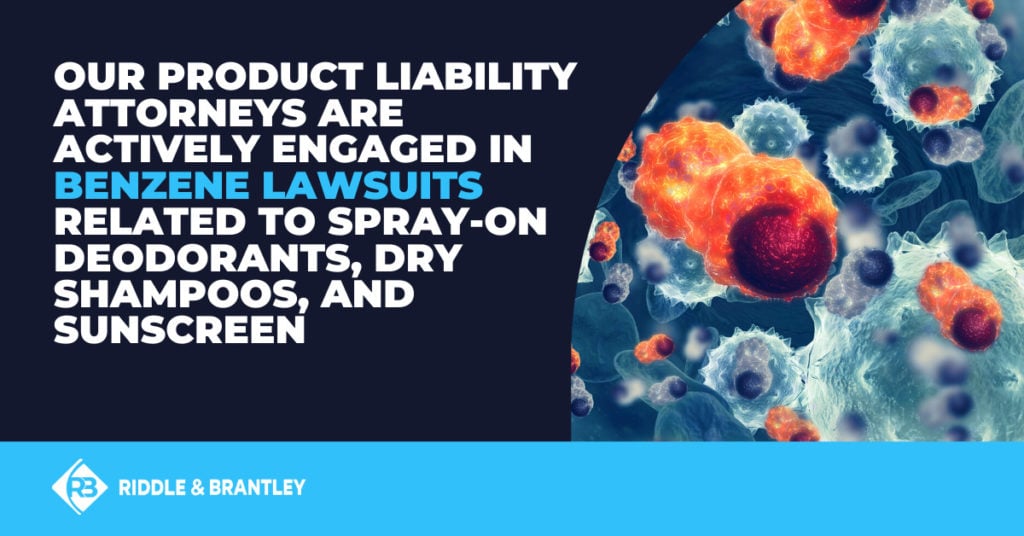 Benzene is a dangerous chemical that is known to cause cancer and other health problems. Recently, benzene has been discovered in many different types of consumer products, including spray-on sunscreen, spray-on deodorant and antiperspirants, and spray-on dry shampoos and conditioners. Benzene lawsuits have been filed alleging that manufacturers failed to warn consumers of the cancer risks associated with benzene in these products. Our firm’s benzene lawsuit attorneys are actively investigating these claims and we are ready to fight for those whose cancer was potentially caused by exposure to benzene in these popular products. Cancers and other health problems that may qualify you or a loved one for a benzene lawsuit include various types of leukemia, non-Hodgkin’s lymphoma, and myelodysplastic syndrome (MDS).
Benzene is a dangerous chemical that is known to cause cancer and other health problems. Recently, benzene has been discovered in many different types of consumer products, including spray-on sunscreen, spray-on deodorant and antiperspirants, and spray-on dry shampoos and conditioners. Benzene lawsuits have been filed alleging that manufacturers failed to warn consumers of the cancer risks associated with benzene in these products. Our firm’s benzene lawsuit attorneys are actively investigating these claims and we are ready to fight for those whose cancer was potentially caused by exposure to benzene in these popular products. Cancers and other health problems that may qualify you or a loved one for a benzene lawsuit include various types of leukemia, non-Hodgkin’s lymphoma, and myelodysplastic syndrome (MDS).
AUGUST 2023 UPDATE: Please note that as of August 2023, we can no longer accept cases involving benzene contamination in sunscreen due to developments in the litigation. Please stay tuned to our website for more information as this litigation evolves.
For a FREE, no-obligation consultation with an experienced benzene lawsuit lawyer handling cancer claims involving spray-on sunscreens, deodorants, and dry shampoos and conditioners, please call 1-800-525-7111 or complete the fast and easy form below. There are no upfront costs and no attorney fees unless we win your benzene cancer lawsuit and you receive compensation. Don’t wait — the longer you wait to call, the harder it may be to prove liability and get you the compensation you deserve. Please call 1-800-525-7111 for a free consultation with an experienced product liability attorney handling benzene lawsuits today.
PLEASE NOTE: Compensable claims related to these spray-on deodorants and body sprays do NOT include rash or burning under the arms.
IMPORTANT: As of early 2022, defendants in benzene lawsuits, including Proctor & Gamble and Johnson & Johnson, strongly deny any liability and/or wrongdoing associated with these claims, and no settlements have been agreed upon.
What Products and Brands Are Involved in Benzene Lawsuits?
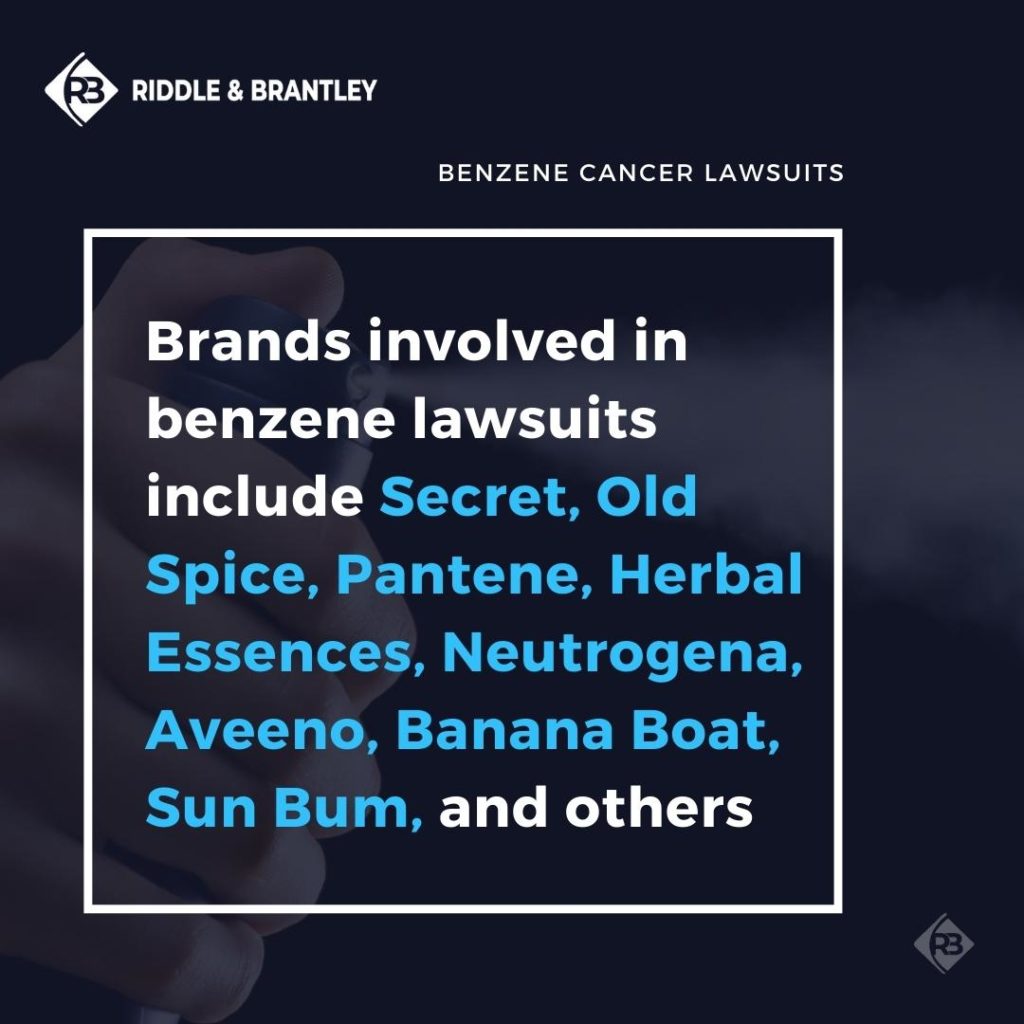 A wide variety of consumer products, including aerosolized, “spray-on” deodorants, antiperspirants, dry shampoos, dry conditioners, and sunscreens have been targeted by recent benzene lawsuits. As of early 2022, benzene cancer lawsuits have been filed against Proctor & Gamble and Johnson & Johnson involving the following products.
A wide variety of consumer products, including aerosolized, “spray-on” deodorants, antiperspirants, dry shampoos, dry conditioners, and sunscreens have been targeted by recent benzene lawsuits. As of early 2022, benzene cancer lawsuits have been filed against Proctor & Gamble and Johnson & Johnson involving the following products.
Deodorants and Antiperspirants
In late 2021, Proctor & Gamble (P&G) issued a voluntary recall of spray-on deodorants and antiperspirants due to benzene contamination in deodorants. This recall involved many several varieties of two popular brands of deodorant — Old Spice and Secret. It is alleged that benzene in spray-on deodorants and antiperspirants may cause leukemia, multiple myeloma, non-Hodgkin’s lymphoma, and potentially other forms of cancer, as well as myelodysplastic syndrome (MDS).
Dry Shampoos and Conditioners
Following its voluntary recall of spray-on deodorants and antiperspirants, Proctor & Gamble (P&G) issued a separate voluntary recall of spray-on, “dry” shampoos and conditioners. P&G said that the discovery of potentially cancer-causing benzene in these dry shampoos and conditioners was “unexpected” and related to the propellant that sprays the product from the can. The dry shampoo recall affects products marketed under many popular brand names, including Pantene, Herbal Essences, Aussie, Old Spice, and Waterless. As with the others, dry shampoo benzene lawsuits filed against P&G allege that benzene in these products causes various types of cancer, including leukemia, multiple myeloma, and non-Hodgkin’s lymphoma, as well as myelodysplastic syndrome (MDS).
Sunscreen
An independent lab identified high levels of benzene in spray-on sunscreen brands in mid-2021. Brands of spray-on sunscreen found to contain elevated levels of benzene include Neutrogena, Aveeno, Sun Bum, CVS Health, Banana Boat, and Walgreens. According to an announcement issued by Valisure, high levels of benzene were found in 27 percent of spray-on sunscreens tested. Some of these products contained up to three times more benzene than the limit set by the Food & Drug Administration (FDA). It has been alleged that benzene in sunscreens caused non-Hodgkin’s lymphoma, various types of leukemia, multiple myeloma, and MDS.
What is Benzene?
Benzene is a chemical that can be both naturally occurring and human-made. It is typically colorless or a light yellow color at room temperature. According to the Centers for Disease Control and Prevention (CDC), benzene is widely used in the United States and ranks among the top 20 industrial chemicals by production volume.
Natural Sources of Benzene
Benzene occurs naturally as an output of volcanos and forest fires. The chemical also naturally occurs in gasoline, cigarette smoke, motor vehicle exhaust, and crude oil.
Human-Made Sources of Benzene
The CDC notes that benzene is often used in the production of plastics, nylon, resins, and synthetic fibers. Benzene is also sometimes used to manufacture certain rubbers, dyes, detergents, lubricants, pharmaceuticals, and pesticides. Scientific research has strongly associated workplace exposure to benzene with the development of certain cancers. Prior to the filing of benzene cancer lawsuits, the dangerous chemical was found in several popular consumer products, including spray-on sunscreens, deodorants, antiperspirants, dry shampoos, and conditioners. For more information on specific brands and products containing elevated levels of potentially cancer-causing benzene, please see the summary above, “What Products and Brands Are Involved in Benzene Lawsuits?”
Why is Benzene Dangerous?
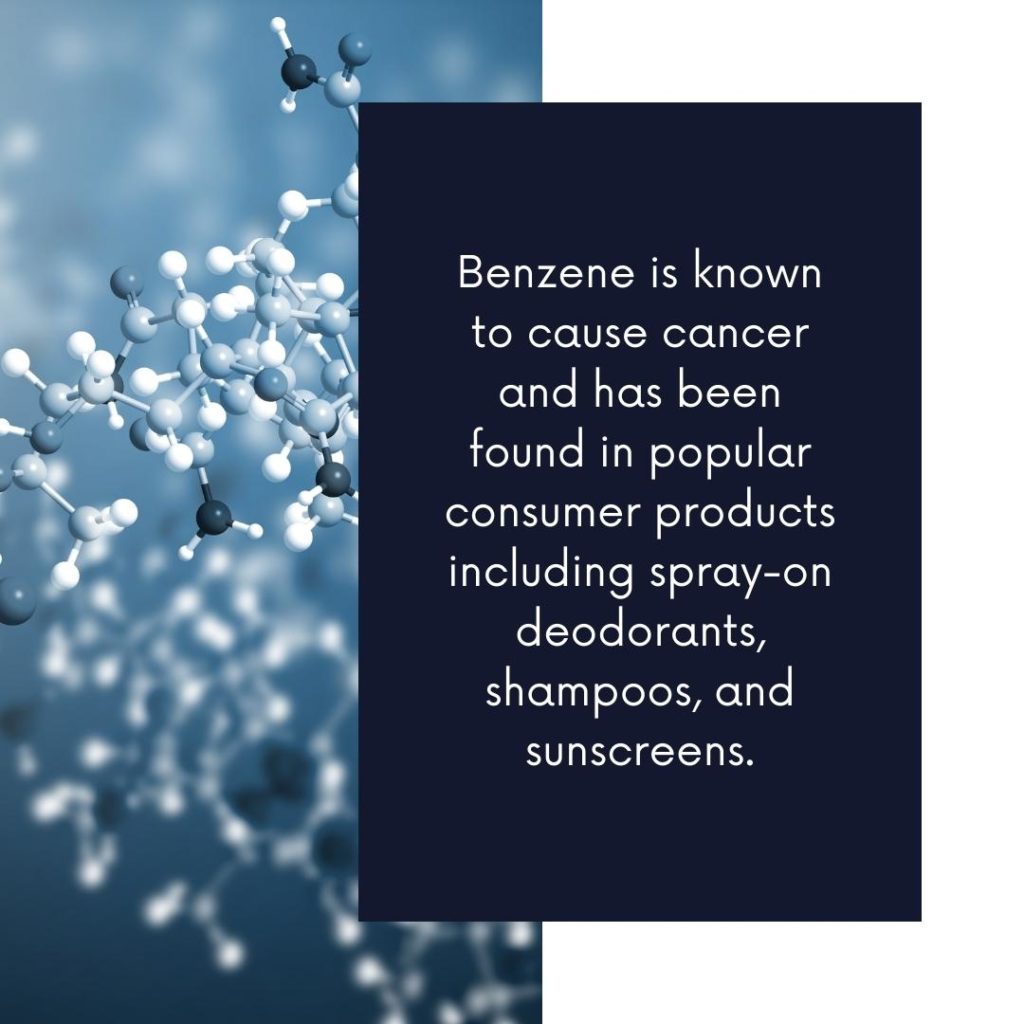 Benzene is known carcinogen, meaning that it can cause cancer in humans. Many prominent scientific organizations have determined that benzene causes cancer, including the Food & Drug Administration (FDA), the Centers for Disease Control and Prevention (CDC), the Environmental Protection Agency (EPA), and the World Health Organization (WHO). A consortium of U.S. federal health and science agencies, the National Toxicology Program, also classifies benzene as “carcinogenic to humans.” The American Cancer Society has also determined that “benzene is known to cause cancer.”
Benzene is known carcinogen, meaning that it can cause cancer in humans. Many prominent scientific organizations have determined that benzene causes cancer, including the Food & Drug Administration (FDA), the Centers for Disease Control and Prevention (CDC), the Environmental Protection Agency (EPA), and the World Health Organization (WHO). A consortium of U.S. federal health and science agencies, the National Toxicology Program, also classifies benzene as “carcinogenic to humans.” The American Cancer Society has also determined that “benzene is known to cause cancer.”
Benzene’s potential to cause cancer lies at the heart of benzene lawsuits alleging that exposure to benzene in popular consumer products causes various types of leukemia, multiple myleoma, and non-Hodgkin’s lymphoma.
Where Does Benzene Exposure Occur?
Industrial workers associated with the products listed above are at especially high risk of benzene exposure, however, benzene is a common chemical and many types of people may be exposed at some point in time. According to the CDC, outdoor air may be contaminated with benzene resulting from vehicle exhaust, cigarette smoke, gas station fumes, and industrial emissions. Indoor air, however, often contains higher levels of benzene than outdoor air, due to the presence of products manufactured with benzene-containing materials, including furniture wax, paints, glues, and detergents.
Exposure Among Industrial Workers
According to the CDC’s National Institute for Occupational Safety and Health (NIOSH), the following workers may be especially at risk for benzene exposure:
- Factory workers where steel or rubber is made and/or processed
- Printing industry workers who handle or are exposed to printing inks
- Firefighters who are exposed to toxic smoke
- Gas station workers
- Workers who make or repair shoes
- Laboratory workers
Exposure Among Consumers
Recent recalls and lab tests have revealed that consumers may be more frequently exposed to benzene than previously known. Elevated levels of benzene have been found in a variety of popular consumer products, including aerosolized sunscreens, deodorants, antiperspirants, shampoos, and conditioners.
Benzene Exposure and Cancer
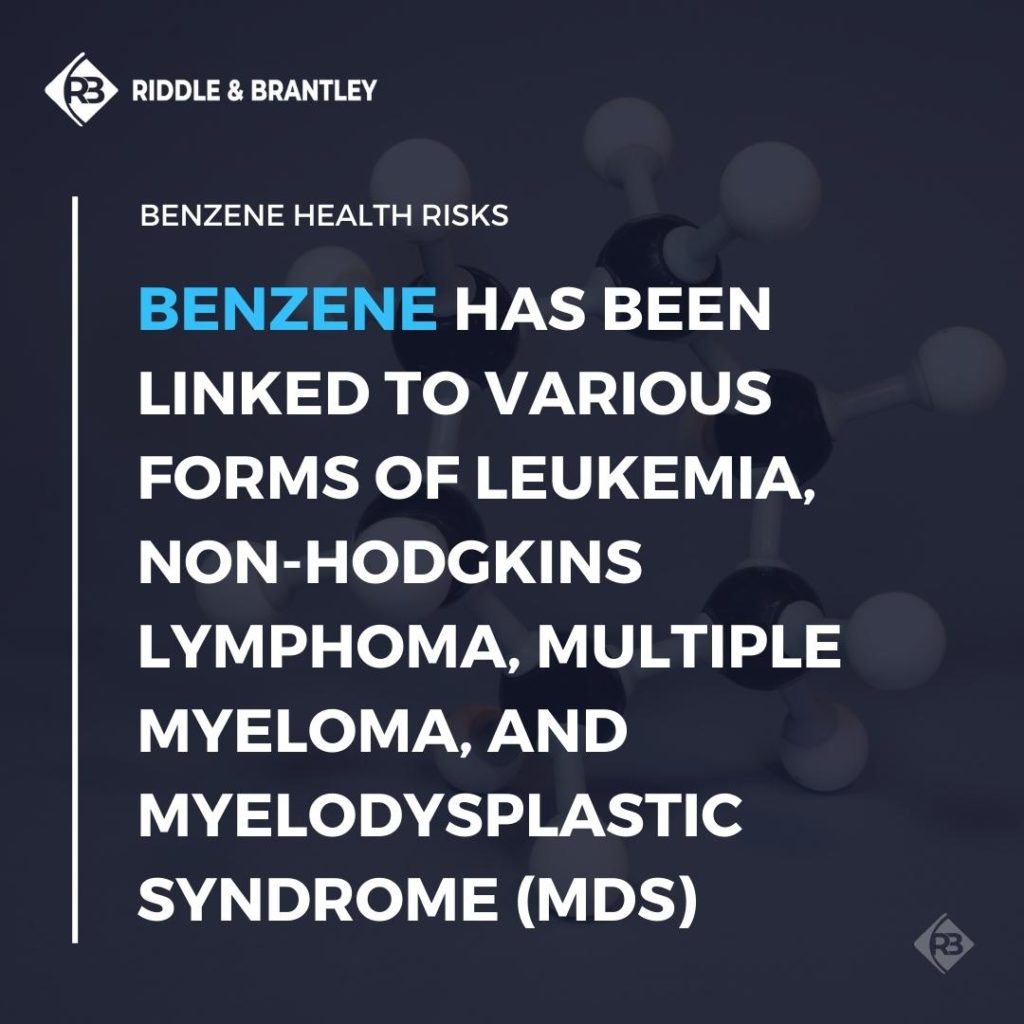 Benzene is a dangerous chemical that is known to cause cancer, especially blood-related cancers like various forms of leukemia, multiple myeloma, and non-Hodgkin’s lymphoma. According to the CDC, “the major effect of benzene from long-term exposure is on the blood” and “the Department of Health and Human Services (DHHS) has determined that benzene causes cancer in humans.” The CDC concludes that “long-term exposure to high levels of benzene … can cause leukemia, cancer of the blood-forming organs.”
Benzene is a dangerous chemical that is known to cause cancer, especially blood-related cancers like various forms of leukemia, multiple myeloma, and non-Hodgkin’s lymphoma. According to the CDC, “the major effect of benzene from long-term exposure is on the blood” and “the Department of Health and Human Services (DHHS) has determined that benzene causes cancer in humans.” The CDC concludes that “long-term exposure to high levels of benzene … can cause leukemia, cancer of the blood-forming organs.”
Recent benzene lawsuits alleging that benzene in consumer products causes cancer are supported by a significant amount of scientific evidence. In this section, we’ll explore the scientific links between benzene exposure and three forms of blood-related cancer — leukemia, multiple myeloma, and non-Hodgkin’s lymphoma — and myelodysplastic syndrome (MDS).
Can Benzene Cause Leukemia?
There is strong scientific evidence that benzene can cause various types of leukemia, including acute myeloid leukemia (AML), acute lymphocytic leukemia (ALL), chronic lymphocytic leukemia (CLL), and childhood leukemia. Recent support for the link between benzene exposure and leukemia includes:
- A 2010 study of occupational benzene exposure that found “consistent evidence that exposure to benzene at work increases the risk of leukemia.”
- A 2014 research study that determined that “long-term exposure to benzene causes several adverse health effects, including an increased risk of acute myeloid leukemia.”
- A 2019 study of workers exposed to benzene that found “the risk for chronic myeloid leukemia was increased” compared to those not exposed to benzene
Can Benzene Cause Lymphoma?
The evidence that benzene exposure increases the risk of lymphoma is strong. In particular, multiple research studies have linked benzene with non-Hodgkin’s lymphoma. Research linking benzene exposure with an increased risk for developing lymphoma include:
- A 2019 study published in the International Journal of Cancer that found evidence of “an association between ambient benzene and risk of … T-cell lymphoma and follicular lymphoma.”
- A 2021 systematic review that found evidence of “a causal link between benzene exposure and non-Hodgkin’s lymphoma.”
- A 2013 study in the journal of the American Cancer Society that determined that “NHL [non-Hodgkin’s lymphoma] incidence was significantly higher in census tracts that were closer, on average, to benzene release sites.”
Can Benzene Cause MDS?
MDS, otherwise known as myelodysplastic syndrome, is a group of bone marrow disorders that occur when the production of blood cells is disrupted. A wide range of scientific evidence supports a link between benzene exposure and MDS, including:
- A 2012 study published in the Journal of the National Cancer Institute that found that “relatively low-level exposure to benzene … was associated with an increased risk of MDS” among petroleum workers.
- A 2017 research study published in the Journal of Occupational and Environmental Medicine that showed a “direct exposure-response pattern” association between certain types of myelodysplastic syndrome and benzene exposure.
The American Cancer Society also reports that exposure to benzene “can also cause mutations that lead to MDS.”
Can Benzene Cause Multiple Myeloma?
Multiple myeloma is a cancer of the plasma cells in a person’s blood. Significant evidence has associated benzene exposure with an increased risk of multiple myeloma, including:
- A 2015 population-based study of workers exposed to benzene that found “evidence of dose-related risk patterns according to cumulative exposure for … multiple myeloma.”
- A 2011 study that found support for “an association between occupational benzene exposure and risk of MM [multiple myeloma].”
Benzene Exposure Symptoms
With benzene being such a common chemical in industrial processes and the outdoor and indoor air, many are exposed without knowing. The CDC has more information on signs and symptoms of benzene exposure, including:
Symptoms of Benzene Exposure via Breathing
Those who breathe in significant levels of benzene may experience any of the following symptoms within minutes to hours of exposure:
- Drowsiness
- Dizziness
- Irregular or rapid heartbeat
- Tremors
- Headaches
- Confusion
- Unconsciousness
- Death
Symptoms of Benzene Exposure via Food or Drink
Those who consume foods or beverages contaminated with elevated levels of benzene may experience any of the following symptoms within minutes to hours of exposure:
- Vomiting
- Stomach irritation
- Dizziness
- Sleepiness
- Rapid or irregular heartbeat
- Convulsions
- Death
The CDC also advises that “direct exposure of the eyes, skin, or lungs to benzene can cause tissue injury and irritation.”
IMPORTANT: If you’ve experienced any of these symptoms after known or suspected exposure to benzene, contact your physician immediately and seek medical attention.
“Can I Get Compensation for Benzene Exposure?”
AUGUST 2023 UPDATE: Please note that as of August 2023, we can no longer accept cases involving benzene contamination in sunscreen due to developments in the litigation. Please stay tuned to our website for more information as this litigation evolves.
Our firm is actively investigating claims of benzene exposure due to contaminated consumer products like certain spray-on sunscreens, deodorants, antiperspirants, shampoos, and conditioners. If you’ve been exposed to benzene through a contaminated consumer product and were later diagnosed with a qualifying cancer or health problem, you may be entitled to compensation in a benzene lawsuit. For a FREE, no-obligation consultation with an experienced product liability lawyer handling benzene lawsuits, please call 1-800-525-7111 or complete the fast and easy form below.
There are no upfront costs and no attorney fees unless we win your benzene cancer lawsuit and you receive compensation. Call 1-800-525-7111 and let’s review your claim.
PLEASE NOTE: Compensable claims related to these spray-on deodorants and body sprays do NOT include rash or burning under the arms.
Contact a Benzene Lawsuit Attorney Today
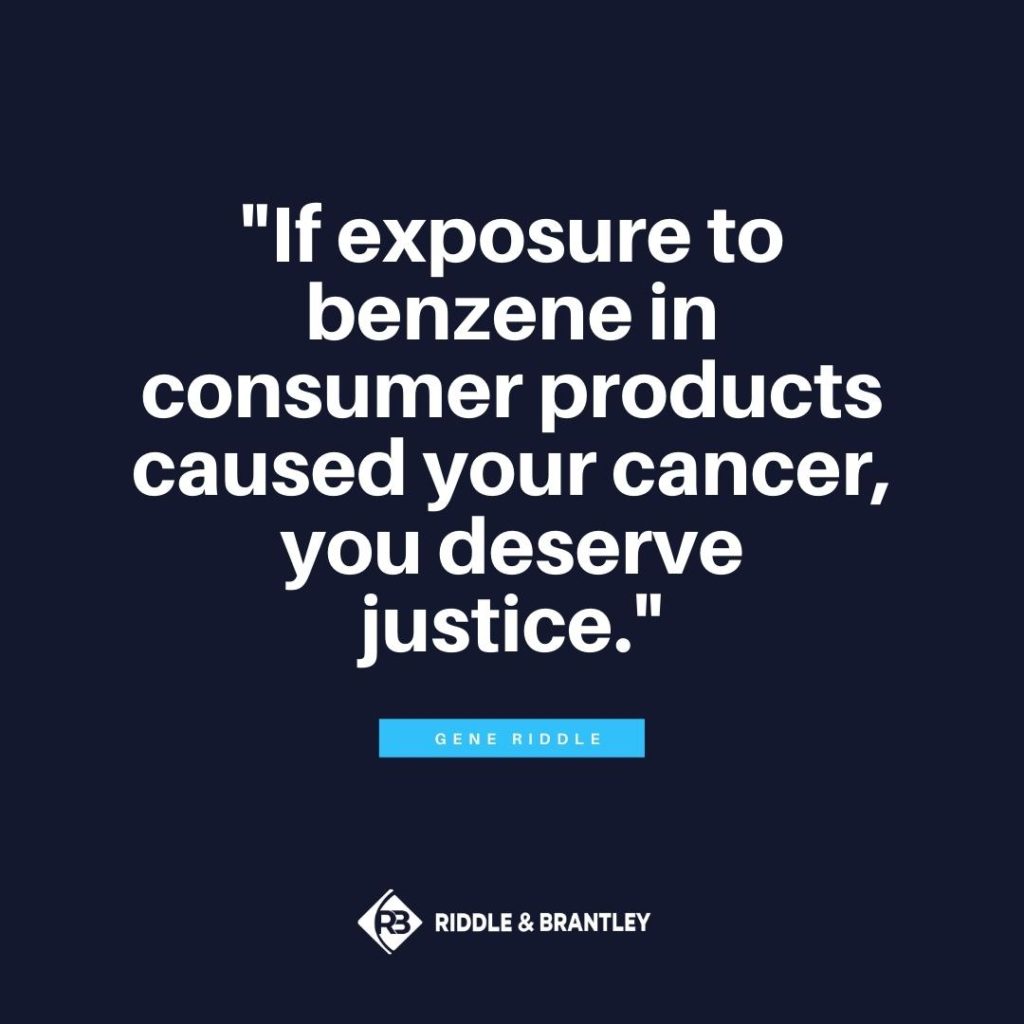 If you’ve suffered from a form of lymphoma (including non-Hodgkins lymphoma), leukemia (including AML, ALL, or CLL), or MDS after using one of the qualifying products below, you may be entitled to compensation in a shampoo benzene lawsuit, deodorant benzene lawsuit, or sunscreen benzene lawsuit. Call 1-800-525-7111 today for a free, no-obligation consultation with the trial lawyers at Riddle & Brantley.
If you’ve suffered from a form of lymphoma (including non-Hodgkins lymphoma), leukemia (including AML, ALL, or CLL), or MDS after using one of the qualifying products below, you may be entitled to compensation in a shampoo benzene lawsuit, deodorant benzene lawsuit, or sunscreen benzene lawsuit. Call 1-800-525-7111 today for a free, no-obligation consultation with the trial lawyers at Riddle & Brantley.
“Do I Qualify for a Benzene Lawsuit?”
Benzene lawsuits are in the very early stages and criteria continue to evolve. Stay tuned to this page for the latest in benzene lawsuit criteria. If you believe you may qualify for a benzene cancer claim or other health problem claim, call 1-800-525-7111 for a free consultation.
Potentially qualifying cancers and health problems include:
- Acute myeloid leukemia (AML)
- Acute lymphocytic leukemia (ALL)
- Chronic lymphocytic leukemia (CLL)
- Non-Hodgkin’s lymphoma (NHL)
- Myelodysplastic syndrome (MLS)
- Multiple myeloma (MM)
Potentially qualifying products include:
- Spray-on deodorants and antiperspirants including certain varieties marketed under brand names:
- Secret
- Old Spice
- Brut
- Tag
- Suave
PLEASE NOTE: Compensable claims related to these spray-on deodorants and body sprays do NOT include rash or burning under the arms.
- Spray-on “dry” shampoos and conditioners including certain varieties marketed under brand names:
- Pantene
- Herbal Essences
- Aussie
- Old Spice
- Waterless
- Spray-on sunscreens including certain varieties marketed under brand names:
- Neutrogena
- Aveeno
- Sun Bum
- Banana Boat
- CVS Health
- Walgreens
Why Riddle & Brantley for Your Benzene Lawsuit?
Riddle & Brantley has been fighting for justice for those who have suffered due to potentially dangerous products since 1985. Our benzene lawsuit lawyers have been recognized for their experience and results by many different membership organizations and awards (see disclaimer below), including:
- Multi-Million Dollar Advocates Forum
- Million Dollar Advocates Forum
- The National Trial Lawyers Top 100
- The National Trial Lawyers Top 40 Under 40
- Super Lawyers
- The Litigator Award
- AV Preeminent by Martindale-Hubbell
- The National Association of Distinguished Counsel
We are proud of the results we’ve secured for our clients (more than $600 million in total compensation recovered for clients since 2000 alone – see disclaimer below) and strive to put our valued clients first. We invite you to review what our clients are saying about their experience working with our attorneys and staff:
“This settlement changed me and my family’s lives.”
–Linda B., Riddle & Brantley client
- “It was nice to see Riddle & Brantley put me and my needs first.” -R.C.
- “Every time I’ve needed them, they were there for me.” -Tyronnie T.
- “They turned a heartbreaking situation completely around.” -Tonya T.
- “If you want a strong firm that fights professionally for your rights and wins, call Riddle & Brantley.” -Donyelle S.
- “They made a hard time in my life easier to endure.” -Melissa C.
Don’t wait. The longer you wait to contact our firm about a potential benzene lawsuit, the harder it may be to prove liability and get you the compensation you need and deserve.
AUGUST 2023 UPDATE: Please note that as of August 2023, we can no longer accept cases involving benzene contamination in sunscreen due to developments in the litigation. Please stay tuned to our website for more information as this litigation evolves.
Call 1-800-525-7111 for a free, no-obligation consultation, and remember — we don’t get paid unless you do. Recovering the compensation you deserve and getting justice for you and your loved ones is our #1 priority. We believe Justice Counts for those who have suffered from cancer or another health problem potentially due to exposure to benzene in consumer products, and we are ready to help however we can.
*** Disclaimer: The results mentioned are intended to illustrate the type of cases handled by the firm. These results do not guarantee a similar outcome, and they should not be construed to constitute a promise or guarantee of a particular result in any particular case. Every case is different, and the outcome of any case depends upon a variety of factors unique to that case.
*** Disclaimer: An attorney must meet certain requirements to join these organizations or receive these awards. For more information on Membership Criteria for Million Dollar Advocates Forum, Multi-Million Dollar Advocates Forum, Super Lawyers, The National Trial Lawyers Top 100, The National Trial Lawyers Top 40 Under 40, The National Association of Distinguished Counsel, AV Preeminent by Martindale-Hubbell, the Litigator Award, and other memberships, awards, and accolades, please visit our Membership Criteria page. These awards and memberships should not be construed as a promise or guarantee of a similar result. Each case is different and must be evaluated separately.